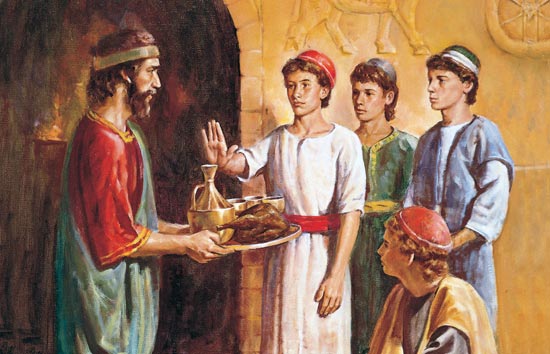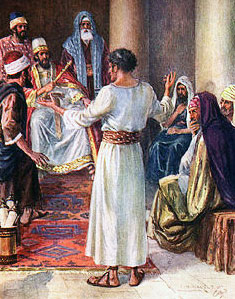| Daniel, a key Old
Testament prophet, is one of my favorite young
heroes. He lived in the time of Israel’s greatest
disaster – during the destruction of Jerusalem and
of the Temple, and the Babylonian exile of many of
its people.
In the Book of Daniel we read the firsthand
account of Daniel being deported from Jerusalem
to Babylon, along with three friends, Hananiah,
Mishael, and Azariah. When Nebuchadnezzar, king
of Babylon, conquered Jerusalem in 606 B.C., he
decided to bring back some of the best and the
brightest of the youth of Israel to become his
servants, to be taught the culture and language
of Babylon, and to be assimilated into what he
considered to be the vastly superior Babylonian
culture.
How did Daniel and his three companions react
to their deportation and new life in
Babylon?
They could have chosen to be resentful towards
their captors, and in anger rant against
them: “These are the rats who destroyed
our nation, wrecked our city, tore down the
house of God and stole the holy things, blinded
our king and took us off into captivity.” Like
an underground resistance movement, seeking to
undermine both culture and society, they could
have chosen to act as “God’s terrorists” and try
to take it down.
Did they experience shame and insecurity before
the apparently stronger victorious culture they
were now immersed in? They could have reasoned
that the safest thing to do was to simply to
huddle in a corner, keep their head down, and
hope that their captives would just leave them
alone. But that would amount to living like a
coward.
Another option they might have considered was
to assimilate to the new culture with open-arms
and open-heart. “If you can’t lick ‘em, join
‘em…” That would have required a readiness to
forget who I really am, and just jump right into
living like everyone else around me. A
decision to simply accept the prevailing
culture, go along with it, be shaped by its
values and its customs, and look as much as
possible just like everyone else. A lot of
the Jews in exile probably did this. You
know what happened to them? They
disappeared. Their lives proved relatively
meaningless for God’s greater purpose for his
people and for the world.
Daniel and his three friends chose none of
these options. They chose instead the course
which the prophet Jeremiah gave:
“Thus says the LORD of
hosts, the God of Israel, to all the exiles whom
I have sent into exile from Jerusalem to
Babylon: Build houses and live in them; plant
gardens and eat their produce. Take wives and
have sons and daughters; take wives for your
sons, and give your daughters in marriage, that
they may bear sons and daughters; multiply
there, and do not decrease. But seek the welfare
of the city where I have sent you into exile,
and pray to the LORD on its behalf, for in its
welfare you will find your welfare”
(Jeremiah 29:4-7).
Jeremiah’s instruction was very simple. Know who
you are in God. Love who you are in
God. Be who you are wherever God places
you. Live in great hope, and grow as a
people of God. Live for him and with him,
and love those around you with his
heart.
Models for today
In a number of ways I think that Daniel and his
friends are excellent models for young
Christians today:
- Daniel and his friends were young.
- They found themselves living in a foreign
culture, which generally paid no attention to
their faith, and when it did, was relatively
hostile to it.
- Furthermore, they found themselves in
circumstances in which they were being taught
the wisdom of this foreign and unbelieving
culture, and they had face the strength of
this culture directly, on their own.
- Their own people were passing through a
very bad time during the Babylonian
exile. They did not enjoy a good
reputation, or much honor. It wasn’t a big
advantage to be associated with the people of
God, and the temptation for these young people
to be ashamed of their own people, and to
avoid being associated with them, must have
been considerable.
Daniel and his friends were all naturally very
bright, talented, and good-looking (you can read
the description in the first chapter of the Book
of Daniel). However, Daniel and his friends
did not rely upon their natural benefits for their
success in life. Nor did they allow the low
reputation of their people to be a reason to evade
identification with them, or to call into question
their fidelity to God.
 Faith, courage, boldness,
and humility
Somehow, and for some reason known only to God,
these young people were chosen by the Lord for a
particular mission. God’s hand was upon them;
his grace was with them; and they knew it. What
was their response to the challenges of this
situation? They chose to stand together in the
Lord and to act with faith, courage, boldness,
and humility. And God was able to do a great
work through these young people – far beyond
what they could have expected or even hoped
for.
As we can see from these verses, Daniel
obviously had a lot going for him, and it would
have been a strong temptation for him to do his
best to look like the “winners”, the “beautiful
people” of the society around him, to assimilate
as much as he could, to make his background very
low profile, to become practically
indistinguishable from the other promising and
gifted young people around him. Many of
the other young Jews who were deported to
Babylon probably did just that. They are not
mentioned here in the book of Daniel, or
anywhere else, because their lives proved
meaningless. They didn’t make a difference with
their lives. They had no impact for the Lord of
any great weight, and they have been utterly
forgotten.
Standing out from the
crowd
Daniel and his three friends stand out from the
crowd. Not because they were more handsome, nor
more naturally gifted with grace, charm,
intelligence, or anything else. Rather, because
they were faithful to the Lord and to their
people, and to the covenant which God had
established with them. They knew who they
were, and they were not ashamed of it. They knew
who the Lord was, and they were true to
him.
Their fidelity was costly. It required faith,
courage, and boldness on their part, and put
them at various points in mortal danger. It also
put them in a place to be blessed and used by
the Lord in extraordinary ways that resulted in
their being placed in ever higher roles of
influence and of authority in the
society/culture that they were called upon to
live in. This in turn required of them even
greater care, vigilance, and fidelity. It made
them even more the target of enemies who feared
their influence and authority; the accusations
and attacks of enemies only increased the need
to respond to their circumstances in faith, in
righteousness, with boldness, courage, and
humility.
Daniel’s dedication
In Chapter 1 in the Book of Daniel (verses 8-16)
we read how Daniel decided firmly in his own
heart that he would not defile himself by
partaking of a number of the pleasant and
desirable things that were offered to him in his
favored role. They were things that were
forbidden by the Law, but hey, everyone was
eating them and enjoying them, and besides, he
had to eat something and this was what was
available. Even from the point of view of being
prudent and reasonable, you could make a good
case that it could have been acceptable for
Daniel to take part in what was being given to
everyone.
But in his zeal for the Lord and for the
covenant which his people had with the Lord,
Daniel not only didn’t wimp out, he decided that
he wouldn’t settle for normal prudence. Rather,
he would boldly go out on a limb, and in faith
he would give the Lord the chance to do
something extraordinary for him and in
him.

First Daniel went to the chief eunuch and asked
for special consideration (see verse 8, Chapter
1). This was already rocking the boat, and could
have been asking for trouble. He risked the
possible displeasure, anger, and rejection of
the chief eunuch – on the one hand, trusting
that the Lord would give him favor in his eyes,
but on the other hand, also being ready to face
the consequences if the Lord chose not to do so.
As it turned out, the Lord did give him favor
and compassion in the eyes of the chief eunuch.
However, the man was (reasonably enough) afraid
for his own skin (because it was the king
himself who had decided what the young people
would eat), and was reluctant to make the kind
of exception that Daniel and his friends were
requesting.
Radical plunge in faith
Daniel and his friends took a deeper and more
radical plunge in faith (see verses 11-13,
Chapter 1). Running the risk of getting into
serious trouble with the chief eunuch, they went
to the eunuch’s steward to propose a test that
relied completely upon the sovereign
intervention of God in his life. Putting
themselves completely in the Lord’s hands, they
proposed that the results of the test would be
so clear and apparent that the steward himself
could make his own decision after observing
those results. They also found favor in the
steward’s eyes, and he agreed to the test.
Daniel and his friends went onto a very strict
vegetarian diet that would be safely keep them
within the dietary demands of the Law, hoping in
the Lord for results that were totally beyond
their control. The steward must have been blown
away by their request: healthy young men
asking to not have to eat the meat, the deserts,
or to drink the wine, so that they could live on
vegetables and water? This is a serious
sacrifice of love in itself on the part of
Daniel and his friends – a three year special
fast!
Anointing for greatness
God acted in these young men of faith, courage,
boldness, and humility, anointing them in a
special way (see verses 14-16, Chapter 1). They
had shown themselves capable of standing firm
for the Lord, of going against the current
around them. This opened the way for the Lord to
give them extraordinary grace, and to cause them
to stand out – again, not merely on the basis of
their personal merits, but on the basis of an
anointing for greatness that the Lord himself
was giving them.
It was manifested in two different ways: First,
they end up with better color, health, and
physical vitality than any of the others around
them, who supposedly were eating much
better. The 10-day test became a three
year program, and the Lord sustained and
strengthened them supernaturally.
Second, they were granted by God a degree of
wisdom and insight so far above that of the
other youths that they became standouts even
among the established wise men and magicians of
the realm (see verses 17-20, Chapter 1). God
wanted them to stand out, so that he could
glorify himself through them. Beyond this,
Daniel was given a spiritual gift of
understanding visions and dreams. It is this
gift which makes him famous in the kingdom, and
which makes him one of the four great prophets
of the Old Testament. God also gave them favor
in the eyes of king Nebachudnezzar, who gave
them a special place before him, and throughout
his reign the king found their wisdom and
counsel 10 times better than that of anyone else
among his wise men, enchanters, and magicians.

Lessons for today
I think we should examine Daniel’s example
very deeply. This is not just a nice story. It
is instruction from the word of God about how to
live as young people in an alien culture in a
way that is faithful to God, and available for
the mission that he is entrusting to us. It
would have been so normal, so easy, so obvious
for Daniel and his friends to take the safe way,
to follow the crowd, to not rock the boat, to
not do something in their faithfulness to God
that would make them look strange and
different.
- They didn’t take the easy way, nor the
coward’s way.
- They didn’t allow themselves to be seduced
by the offer of wealth, power, and
pleasures.
- They also didn’t take the hostile and
aggressive way that would see their
surrounding culture as the enemy.
They recognized that, even in a situation of many
challenges and difficulties, they had a special
identity, a call from the Lord. They pursued
fidelity to the Lord with a humble boldness that
won them the favor of those whose favor they
needed. They went out on a limb in their trust
that God would intervene on their behalf, that the
Lord would use them where he had placed them, and
that their best response in every circumstance
would be faith and faithfulness, with a blending
of boldness and humility which allowed lots of
room for grace to do its work.
Let’s choose to follow their example and allow
the Lord to strengthen us in faith, courage,
boldness, and humility.
> See
related article: Faithfulness
and Courage Under Fire
–
Shadrach, Meshach, and Abednego
|
From the Book of
Daniel
Chapter 1
.
1 In the third year of the reign
of Jehoi'akim king of Judah, Nebuchadnez'zar
king of Babylon came to Jerusalem and
besieged it. 2 And the Lord gave Jehoi'akim
king of Judah into his hand, with some of
the vessels of the house of God; and he
brought them to the land of Shinar, to the
house of his god, and placed the vessels in
the treasury of his god.
3 Then the
king commanded Ash'penaz, his chief
eunuch, to bring some of the people of
Israel, both of the royal family and of
the nobility, 4 youths without blemish,
handsome and skilful in all wisdom,
endowed with knowledge, understanding
learning, and competent to serve in the
king's palace, and to teach them the
letters and language of the
Chalde'ans.
5 The king
assigned them a daily portion of the rich
food which the king ate, and of the wine
which he drank. They were to be educated
for three years, and at the end of that
time they were to stand before the king. 6
Among these were Daniel, Hanani'ah,
Mish'a-el, and Azari'ah of the tribe of
Judah. 7 And the chief of the eunuchs gave
them names: Daniel he called
Belteshaz'zar, Hanani'ah he called
Shadrach, Mish'a-el he called Meshach, and
Azari'ah he called Abed'nego.
8 But Daniel
resolved that he would not defile himself
with the king's rich food, or with the
wine which he drank; therefore he asked
the chief of the eunuchs to allow him not
to defile himself. 9 And God gave Daniel
favor and compassion in the sight of the
chief of the eunuchs; 10 and the chief of
the eunuchs said to Daniel, "I fear lest
my lord the king, who appointed your food
and your drink, should see that you were
in poorer condition than the youths who
are of your own age. So you would endanger
my head with the king."
11 Then
Daniel said to the steward whom the chief
of the eunuchs had appointed over Daniel,
Hanani'ah, Mish'a-el, and Azari'ah; 12
"Test your servants for ten days; let us
be given vegetables to eat and water to
drink. 13 Then let our appearance and the
appearance of the youths who eat the
king's rich food be observed by you, and
according to what you see deal with your
servants."
14 So he
hearkened to them in this matter, and
tested them for ten days. 15 At the end of
ten days it was seen that they were better
in appearance and fatter in flesh than all
the youths who ate the king's rich food.
16 So the steward took away their rich
food and the wine they were to drink, and
gave them vegetables.
17 As for
these four youths, God gave them learning
and skill in all letters and wisdom; and
Daniel had understanding in all visions
and dreams.
18 At the
end of the time, when the king had
commanded that they should be brought in,
the chief of the eunuchs brought them in
before Nebuchadnez'zar. 19 And the king
spoke with them, and among them all none
was found like Daniel, Hanani'ah,
Mish'a-el, and Azari'ah; therefore they
stood before the king.
20 And in
every matter of wisdom and understanding
concerning which the king inquired of
them, he found them ten times better than
all the magicians and enchanters that were
in all his kingdom. 21 And Daniel
continued until the first year of King
Cyrus.
John
Keating is Vice-President of the Sword
of the Spirit and a frequent speaker for
Kairos and Sword of the Spirit conferences and
retreats. He is an elder in the Servants
of the Word, a missionary brotherhood of
men living single for the Lord. He currently
lives in Manila, Philippines.
|



